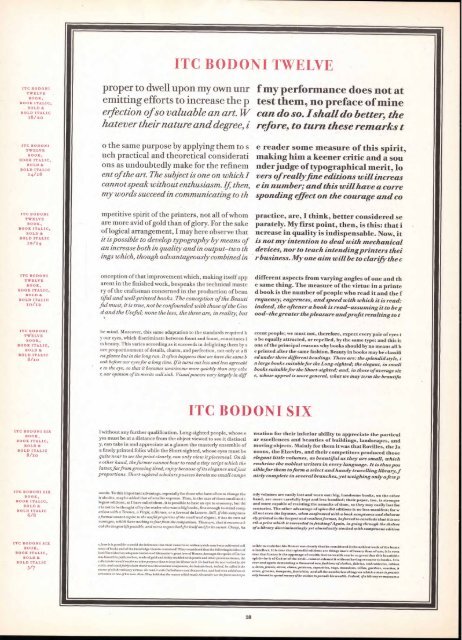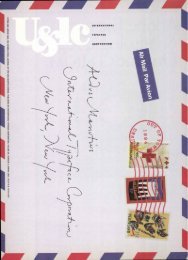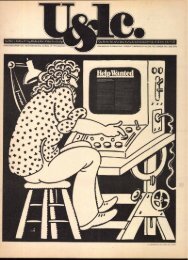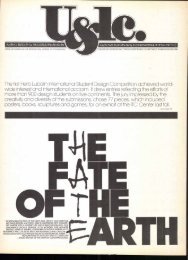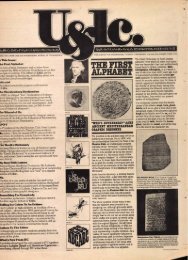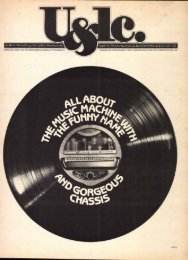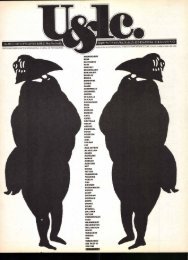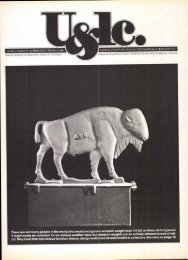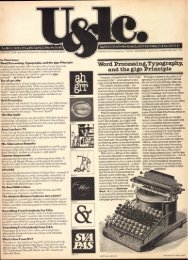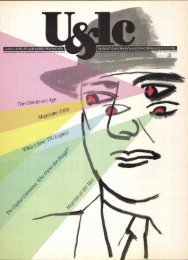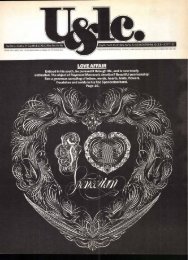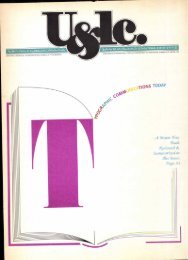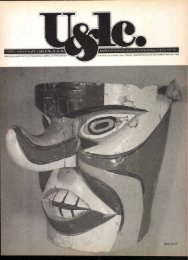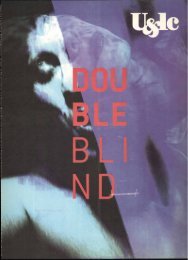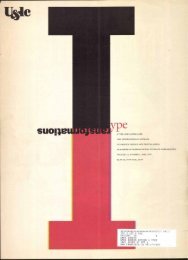Create successful ePaper yourself
Turn your PDF publications into a flip-book with our unique Google optimized e-Paper software.
ITC BODONI<br />
TWELVE<br />
BOOK,<br />
BOOK ITALIC,<br />
BOLD &<br />
BOLD ITALIC<br />
18/20<br />
ITC BODONI<br />
TWELVE<br />
BOOK,<br />
BOOK ITALIC,<br />
BOLD &<br />
BOLD ITALIC<br />
14/16<br />
ITC BODONI<br />
TWELVE<br />
BOOK,<br />
BOOK ITALIC,<br />
BOLD &<br />
BOLD ITALIC<br />
12/14<br />
ITC BODONI<br />
TWELVE<br />
BOOK,<br />
BOOK ITALIC,<br />
BOLD &<br />
BOLD ITALIC<br />
10/12<br />
ITC BODONI<br />
TWELVE<br />
BOOK,<br />
BOOK ITALIC,<br />
BOLD &<br />
BOLD ITALIC<br />
8/10<br />
ITC BODONI SIX<br />
BOOK,<br />
BOOK ITALIC,<br />
BOLD &<br />
BOLD ITALIC<br />
8 /1 o<br />
ITC BODONI SIX<br />
BOOK,<br />
BOOK ITALIC,<br />
BOLD &<br />
BOLD ITALIC<br />
6/8<br />
ITC BODONI SIX<br />
BOOK,<br />
BOOK ITALIC,<br />
BOLD &<br />
BOLD ITALIC<br />
5 /7<br />
ITC BODONI TWELVE<br />
proper to dwell upon my own unr f my performance does not at<br />
emitting efforts to increase the p test them, no preface of mine<br />
erfection of so valuable an art. W can do so. I shall do better, the<br />
hatever their nature and degree, i refore, to turn these remarks t<br />
o the same purpose by applying them to s<br />
uch practical and theoretical considerati<br />
ons as undoubtedly make for the refinem<br />
ent of the art. The subject is one on which I<br />
cannot speak without enthusiasm. If then,<br />
my words succeed in communicating to th<br />
mpetitive spirit of the printers, not all of whom<br />
are more avid of gold than of glory. For the sake<br />
of logical arrangement, I may here observe that<br />
it is possible to develop typography by means of<br />
an increase both in quality and in output-two th<br />
ings which, though advantageously combined in<br />
onception of that improvementwhich, making itself app<br />
arent in the finished work, bespeaks the technical maste<br />
ry of the craftsman concerned in the production of beau<br />
tiful and well printed books. The conception of the Beauti<br />
ful must, it is true, not be confounded with those of the Coo<br />
d and the Useful; none the less, the three are, in reality, but<br />
he mind. Moreover, this same adaptation to the standards required b<br />
y our eyes, which discriminate between fount and fount, constitutes i<br />
is beauty. This varies according as it succeeds in delighting them by s<br />
ure proportionment of details, charm, and perfection, not only at a fi<br />
rst glance but in the long run. It often happens that we have the same b<br />
ook before our eyes for a long time. If it turns out less and less agreeabl<br />
e to the eye, so that it becomes wearisome more quickly than any othe<br />
r, our opinion of its merits will sink. Visual powers vary largely in di<br />
1 without any further qualification. Long-sighted people, whose e<br />
yes must be at a distance from the object viewed to see it distinctl<br />
y, can take in and appreciate at a glance the masterly ensemble of<br />
a finely printed folio: while the Short-sighted, whose eyes must be<br />
quite near to see the print clearly, can only view it piecemeal. On th<br />
e other hand, the former cannot bear to read a tiny script which the<br />
latter, far from growing tired, enjoy because of its elegance and just<br />
proportions. Short-sighted scholars possess herein no small compe<br />
ounds. To this important advantage, especially for those who have often to change the<br />
it abodes, maybe added that of smaller expense. Thus, in the case of these small and e<br />
legant editions, as I have called them, it is possible to have an eye to economy; but thi<br />
s is not to be thought of by the reader who wants big books, fine enough to stand comp<br />
arison with a Terence, a Virgil, a Horace, or a Juvenal du Louvre. Still, if this sumptuou<br />
s format cannot aspire to the useful properties of the small and elegant, it has its own ad<br />
vantages, which have nothing to fearfrom the comparison. These are, that it ensures a b<br />
ook the longest life possible, and earns respect both for itself and for its owner. Cheap, ha<br />
s, how is it possible to avoid the inference that their owner is no ordinary rich man but a cultivated eoll<br />
ector of books and of the knowledge therein contained? Pliny considered that the following incident of<br />
itself furnished an adequate instance of Alexander's great love of Homer. Amongst the spoils of Darius<br />
was found his perfume-box, made of gold and richly studded with pearls and other precious stones; thi<br />
s Alexander would use for no other purpose than to keep his Horner in it. He had had the text revised byAri<br />
stotle, and couldfairly claim that it was his constant companion, his bedside book; indeed, he called it the<br />
source of all the military virtues. He read it with. Callisthenes and Anavarchus, and had even added an ob<br />
servation or two of his own. Now Pliny held that the reason which madeAlevander use the finest casket po<br />
ITC BODONI SIX<br />
18<br />
e reader some measure of this spirit,<br />
making him a keener critic and a sou<br />
nder judge of typographical merit, to<br />
vers of reallyfine editions will increas<br />
e in number; and this will have a corre<br />
sponding effect on the courage and co<br />
practice, are, I think, better considered se<br />
parately. My first point, then, is this: that i<br />
ncrease in quality is indispensable. Now, it<br />
is not my intention to deal with mechanical<br />
devices, nor to teach intending printers thei<br />
r business. My one aim will be to clarify the c<br />
different aspects from varying angles of one and th<br />
e same thing. The measure of the virtue in a printe<br />
d book is the number of people who read it and the f<br />
requency, eagerness, and speed with which it is read:<br />
indeed, the oftener a book is read-assuming it to be g<br />
ood-the greater the pleasure andprofit resulting to t<br />
erent people; we must not, therefore, expect every pair of eyes t<br />
o be equally attracted, or repelled, by the same type: and this is<br />
one of the principal reasons why books should by no means all b<br />
e printed after the same fashion. Beauty in books maybe classifi<br />
ed under three different headings. These are: the splendid style, i<br />
n large books suitable for the Long-sighted; the elegant, in small<br />
books suitable for the Short-sighted; and, in those of average siz<br />
e, whose appeal is more general, what we may term the beautifu<br />
nsation for their inferior ability to appreciate the particul<br />
ar excellences and beauties of buildings, landscapes, and<br />
moving objects. Mainly for them it was that Rovilles, the Ja<br />
nsons, the Elzevirs, and their competitors produced those<br />
elegant little volumes, as beautiful as they are small, which<br />
enshrine the noblest writers in every language. It is thus pos<br />
sible for them to form a select and handy travelling library, f<br />
airly complete in several branches, yet weighing only a few p<br />
ndy volumes are easily lost and worn out: big, handsome books, on the other<br />
hand, are more carefully kept and less handled; their paper, too, is stronger<br />
and more capable of resisting the assaults of time, so they may easily last for<br />
centuries. The other advantage of splendid editions is no less manifest; for w<br />
ill not even the layman, when confronted with a book sumptuous and elaborat<br />
ely printed in the largest and costliest format, be forced to conclude that it is wo<br />
rth a price which it succeeded in fetching? Again, in going through the shelves<br />
of a library discriminatingly yet abundantly stocked with sumptuous edition<br />
ssible to enshrine his Homer was clearly that he considered it the noblest work of the huma<br />
n intellect. It is true that splendid editions are things more of luxury than of use; it is even<br />
true that luxury is the appanage of wealth; but no wealth can be so great that this insatiable<br />
spirit—be it of God or of the devil—cannot exhaust it without having recourse to books. It is<br />
ever and again demanding a thousand new fashions of clothes, fabrics, embroideries, ribbon<br />
s, laces, jewels, silver, china, pictures, tapestries, rugs, mansions, villas, gardens, coaches, h<br />
orses, grooms, banquets, festivities, and all the numberless things on which a man is practic<br />
ally bound to spend money if he wishes to parade his wealth. Indeed, ifa library or museum o


